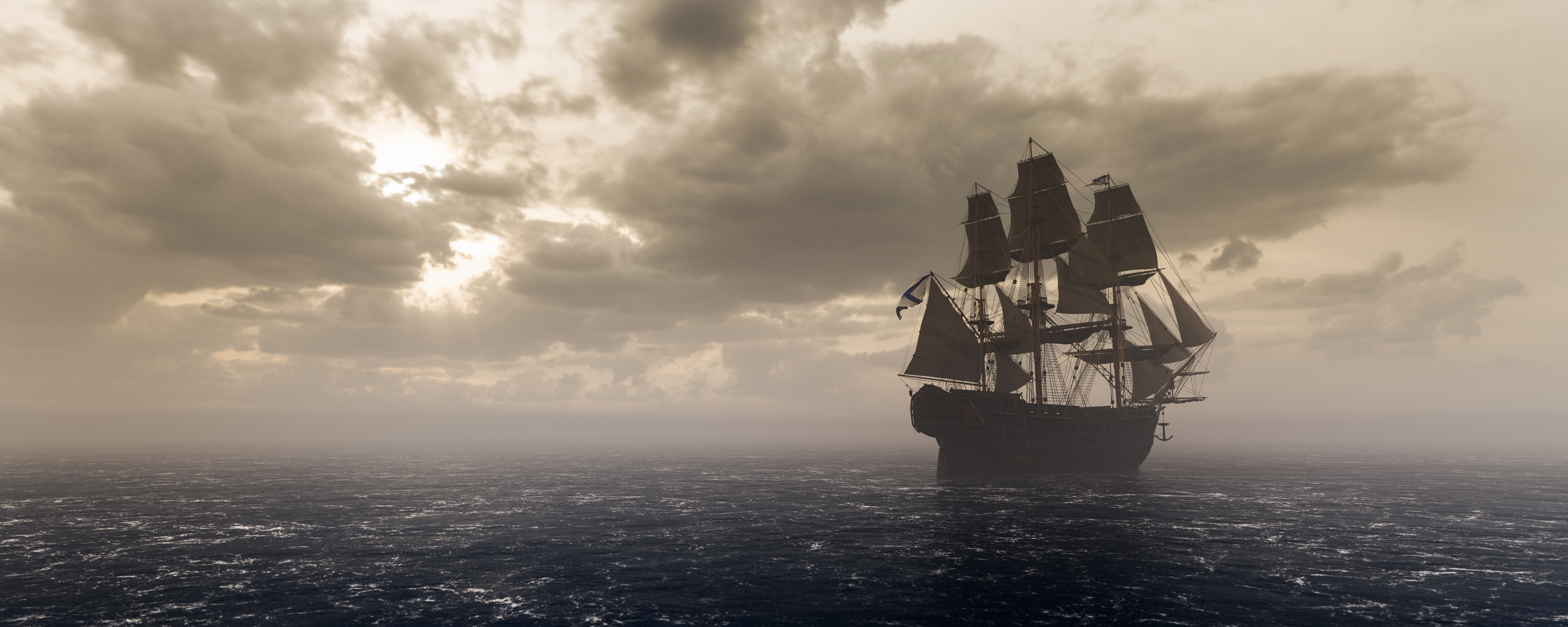Dust the cobwebs inside your home or you’ll never make any money. Don’t allow a mop to sweep across your feet or you’ll never get married. If there is a snake in your dream you must fight it, for if it bites you harm will come to you and your loved ones. Every corner of our planet is teeming with local superstitions and cultures that influence the way people navigate the world around them. Nautical superstitions are no exception. Across the seas, sailors believed bad luck or bad weather would follow them on a voyage for a variety of reasons. Read ahead to learn about these superstitions and see how to best avoid misfortune and bad luck before your next journey and if you are looking for peace of mind on the water, don't leave it all to chance, check out insurance for your boat from Ahoy! we offer insurance for boaters across the US from California Boat Insurance to Florida!
1. Don’t go bananas
Many mariners believed that carrying bananas on board was bad luck for the crew and brought misfortune to the vessel–bad news for those men working on cargo ships traveling from Latin America. Men sometimes got sick or even threw themselves overboard on vessels carrying bananas. Now, historians understand that these reactions weren’t due to the bananas, but rather the spiders that accompanied them. Bunches of bananas are home to various spider varieties, many of which have a venomous or fatal bite. Most likely, crew members were bitten by spiders and had terrible reactions, thus resulting in this seafaring fear of banana cargo.
2. Man overboard! On purpose?
Scottish fishermen have their own way of battling bad luck on the water. If there was one particularly bad fishing day, fishing crews were known to throw one of their own into the water and then rescue him. Some said this spectacle was to attract large fish to the area, while others believed it had a more sacrificial function for the waters. Either way, this practice made the Scottish deft at successfully executing man overboard rescues.
3. Whatever you do, don’t shoot the albatross
One of the most well-known mariner superstitions involves the protection of seabirds, specifically the albatross and the seagull. Killing these animals brings bad luck to you, your vessel, and your crew. If you need evidence, look no further than Samuel Taylor Coleridge’s The Rime of the Ancient Mariner, a lyrical ballad which details the unlucky days that follow a sailor after he kills an albatross. This story serves as a warning to all salts young and old: leave those seabirds alone, or be damned to bad luck for all your days.
4. Don’t forget toll money for the underworld
Many ancient sailors on the Mediterranean practiced placing a coin under the mast for Charon, the ferryman who crosses dead souls across the river in the Underworld. Should a sailor die at sea, this coin below the mast paid their passage. Those who perished empty-handed were forced to wander the shores of the Underworld for one hundred years before earning their place on Charon’s vessel. So don’t forget to slip that coin under the mast before your next voyage–better safe than sorry.
5. Whistling
Even today, whistling on a vessel is deemed to bring about bad weather and strong winds. This nautical superstition is ancient, crossing geography and language barriers. Many transatlantic navigators were punished for whistling on deck and calling stronger winds. However, in places such as Russia, whistling was thought to be a tool to cause necessary air flow when in light weather conditions. Mariners even had special whistles reputed to attract fair winds.
6. St. Elmo’s Fire–Lightning shooting out from the mast?
This natural phenomenon is actually said to mark good luck on vessels that it impacts and is too cool to not talk about here. During a storm or volcanic activity, a corona discharge of plasma can erupt from a mast or spreader bars. This creates a blue or violet light, similar to a lightning strike, and a loud hissing or buzzing sound. Even though St. Elmo’s Fire can now be explained using science, many sailors before believed it to be an omen from the heavens. A sailor in 1605 observed the phenomenon, writing: “In the extremity of our storm appeared to us in the night, upon our maine Top-mast head, a flame about the bigness of a great Candle … holding it a most divine token that when it appeareth the worst is past. As, thanked be God, we had better weather after it.”
7. Women onboard? Bad luck. Naked women onboard? Encouraged.
This outdated superstition has been prevalent among mariners since crews of men ever began trading and exploring the seas. Some cultures believed that having a woman aboard was bad luck, since the ship was considered to be female and was jealous of other women onboard. Others believed having a woman onboard made the seas angry and brought bad weather. However, naked women were said to calm the seas and bring good fortune, which is why so many traditional figureheads depict bare-breasted women. Good luck also came from a woman giving birth onboard, especially if she gave birth to a boy.
Now, sailors understand that this myth originates from the fact that crewmembers were apparently unable to focus on tasks with women aboard. Crew was often isolated from women for many months on end, making them easily distracted by a female presence. Today women captain and work on vessels all over the world, so this myth has failed the test of time.
8. Don’t start a trip on Friday
Religion has played a huge role in nautical history, with the church being known to sponsor voyages, so it’s no surprise that religious lore influences some sailor superstitions. One nautical superstition warns that voyages should never begin on a Friday. Some believe this is because Jesus Christ was crucified on a Friday. Others think that it has to do with the Jewish shabbat, a holy day honored by not working or traveling. Either way, this superstition gives sailors a good reason to take a long weekend by starting a voyage on Thursday and avoiding any bad luck that may befall them on a Friday.
9. “Red sky at night, sailor’s delight. Red sky in morning, sailor take warning”
This superstition is self-explanatory and also holds up fairly well to meteorological predictions. The red sky at night is beautiful, but the red sky in the morning foreshadows bad weather later in the day.
10. Watch your step
Always step onto a boat with your right foot, as starting with your left foot is sure to bring bad luck and lead to misfortune. Sailors believed that boarding a boat with your left foot first would cause you to stumble or endure hardship during the voyage. Next time you are stepping foot on a cabin cruiser for a leisurely cruise remember this!
11. Don’t forget the barrel–just in case you run into a sea monster
Every deep body of water has a monster lurking in the dark below. These monsters are always bad luck and bring misfortune to the crew. Fortunately, some cultures have ideas about how to safely escape these encounters. For example, the Umibōzu, a Japanese sea spirit, has been sighted in waters along the coast of Japan for centuries. When it appears, the crew must toss over a bottomless barrel, which confuses and distracts Umibōzu. While the creature toys with the object, the vessel makes its escape.
12. Beware of clinking glasses
Gathering the crew together to drink and eat while underway is a special occasion, but a special precaution must apply to toasts. Never clink glasses during a toast, since the sound is said to stir and agitate the souls of dead sailors. If these souls awaken, they will bring misfortune to the voyage.
13. Make an offering to the sea to bring good fortune
The best way to bank good luck for the journey ahead is by making an offering to the sea. Seafaring peoples across all bodies of water at some point or another have practiced offerings. Some fishermen are known to toss a pint of whiskey into the sea as an offering, while others cast hair, flowers, coins, and other objects ahead of a voyage. Today, you must be conscious of the environmental impact of your offering. Don’t offer up anything made of plastic or containing harmful chemicals that could harm the ocean or marine life. Instead, some people today practice offerings in the form of beach clean up or retrieving plastic from the water and disposing of it. No matter how you decide to honor the water before setting sail, remember to always respect Mother Nature and be aware of the nautical superstitions around you–who knows which ones may turn out to be true?


